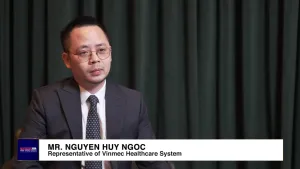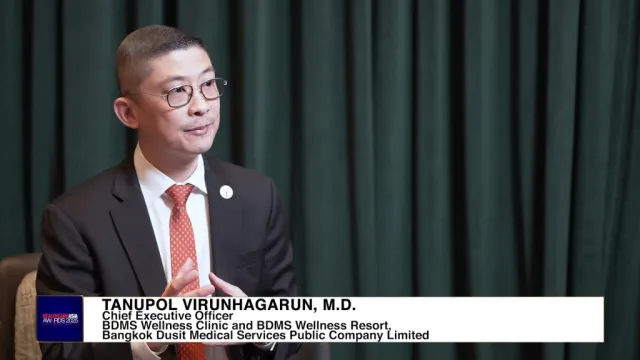
There is no sector more important than health: PwC
Hear PwC talk about the future of the healthcare industry in the inaugural Healthcare Asia Forum 2016.
A new era of healthcare is blossoming in Southeast Asia, headlined by technological advances, empowered consumers and rising demand by an aging population, according to professional services giant PwC.
“While many of those trends have been emerging for some time, never before have they been accompanied by a rapid shift in dollars, triggering major changes in behaviour and fundamentally altering the business of healthcare,” PwC said.
PwC is a thought leader for the inaugural Healthcare Asia Forum 2016, which will feature key speakers from the network in its Kuala Lumpur (April 7), Jakarta (April 28), Singapore (May 12), and Bangkok (May 26) legs.
The Kuala Lumpur leg will feature Christopher Norton, a director for healthcare in the Southeast Asia consulting practice of PwC. Chris leads healthcare consulting team in the region working with both private and public sector clients. With 16 years of experience in the healthcare sector, he has extensive knowledge in Health IT, productivity, project management, and change management. Aside from being a qualified registered nurse, Chris has also two Master Degrees in Health Service Management and Nursing and is a qualified PRINCE 2 and MSP Practitioner.
Kylie Collins, a senior healthcare advisor in the Southeast Asia Consulting practice will be speaking at the Jakarta leg of Healthcare Asia Forum 2016. Kylie leads the healthcare consulting team in Indonesia, and has experience in major transformational public sector reform, strategic planning and business models in Australia, United Kingdom, and South East Asia. She has 15 years’ work experience in the Health sector and is a qualified Occupational Therapist. Prior to joining PwC, Kylie worked in clinical delivery and hospital management roles.
David McKeering, Global Healthcare Markets Leader, PwC Southeast Asia Consulting, will be speaking at the Singapore leg of the forum. With a recognised track record in both private and public sectors, David has been the national healthcare leader for PwC Australia as well as the consulting site leader for Queensland.
Rebecca Norton, senior healthcare advisor, PwC Southeast Asia Consulting, will be speaking at the final stop of the Healthcare Asia Forum 2016 in Bangkok. With over nine years of experience in the health and public sector industry, Rebecca has extensive experience engaging staff, implementing change, developing new organisational design and strategy, and a deep knowledge of health information, data and performance metrics.
Here’s more from PwC:
HCA: How would you describe the current state of healthcare in Southeast Asia?
There is no other sector as important as health. Health matters to each of us as individuals. It is our most precious and valuable asset and connects us all like no other. Health also matters to society. It lies at the heart of our economic, political, social and environmental prosperity and it is now the world’s largest industry – with a value and cost three times greater than the banking sector. Technological advances, empowered consumers, disruptive new entrants, and rising demand by an aging population are ushering in a new era in healthcare in South East Asia. While many of those trends have been emerging for some time, never before have they been accompanied by a rapid shift in dollars, triggering major changes in behaviour and fundamentally altering the business of healthcare.
HCA: Please give us a brief overview of the current trends in healthcare in the region
An ageing population in the region will result in greater healthcare expenditure by the elderly - On an average, about 60-70% of the population in the Southeast Asia region is in the working age group of 15-64 years. Singapore and Thailand have among the highest percentage of aging population in the above 65 years age group. This is expected to result in a greater demand for quality healthcare services for the elderly, especially in these two regions. The percentage of people over age 65 is expected to more than quadruple by 2050 in Southeast Asia. As people age they have significantly more orthopedic problems. A December 2013 report by the International Osteoporosis Foundation indicated that the number of people at high risk for osteoporosis in the Philippines will reach four million by 2020 and reach 10.2 million by 2050. Also by 2050, more than seven million Vietnamese women will be at risk of developing osteoporosis.
Private health expenditure is high relative to government expenditure in the region - The private sector healthcare expenditure would continue to exceed public healthcare expenditure in Indonesia. The roll-out of national health insurance program (through 2019) is expected to increase the overall healthcare expenditure. In 2012, private expenditure in Malaysia represented just under 53% of the total healthcare spending. However, the government expenditure is expected to increase with the government’s announcement to recruit 6,800 nurses as part of its budget for 2014. The government health expenditure in Philippines (3-3.5% of GDP) falls short of the WHO standard of 5%. However, the government is now taking steps to boost public’s access to healthcare and aims to provide universal health coverage by 2016. In 2012, the Singapore government announced that it would increase its yearly healthcare expenditure to $6.35 B over the next five years. In March 2013, the government announced that it will increase its spending on healthcare from the current one-third to 40% of total health expenditure or even more in the future. Due to the universal healthcare system in Thailand, government expenditure on healthcare as a percentage of total healthcare expenditure was more than 70% in 2012, although the funds were unequally distributed. In Vietnam, there will be a rise in the private healthcare expenditure as the government plans to increase public hospital fees between 2012 and 2018. This expenditure will be borne by the patients due to low funding from the government.
Rapid epidemiological transition is also occurring, with the disease burden shifting from infectious to chronic diseases - About 30 percent of the deaths in Southeast Asian countries could be attributed to non-communicable diseases and impact the productive 15-to-59 age group. In Indonesia, non-communicable diseases including cardiovascular diseases, cancer, diabetes and respiratory diseases account for 64% of all deaths. Almost 200 million of the world’s 370 million people diagnosed with diabetes live in Asia. Indonesia is among the top 10 nations with the most diabetics. In addition, Vietnam, Malaysia, and the Philippines are forecast to have increasingly high levels of new diabetes diagnoses over the next two decades. While one in five Malaysians 30 years of age and older have diabetes, less than half have been diagnosed. Almost 60% of the 17 million annual cardiovascular-disease-related deaths occur in Asia. An increasing focus on preventing, diagnosing, and treating cardiovascular issues has resulted in an increased demand for cardiac devices. An estimated 25–30% of deaths in Southeast Asia are caused by cardiovascular disease. In Malaysia, approximately half of those over the age of 30 have hypertension. Every year, more than six million Asians are diagnosed with cancer, and four million die from the disease. Among new cases of cancer globally, half are in Asia. The ASEAN nations are also experiencing increasingly high cancer rates. The most common cancers in Southeast Asia are lung, breast, liver, and colorectal cancers.
HCA: What trends do you see developing in the region in the coming years?
In the New Health Era in South East Asia, patients will become first and foremost consumers, with the freedom that come with making more decisions on their health through a rise in financial affluence. These consumers will demand a continuum of well-being - a series of seamlessly integrated, customised health services aligned to their personal health philosophy. Consumers in the New Health Era will reward trusted service providers that can help achieve this. In the New Health Era, the mere collection of data will be replaced with lightning-fast analysis delivered directly to a care team that anticipates problems before they arise. Individuals will be co-creators of their health decisions, spending more of their discretionary dollars on tools that help them live well. Care delivery, following the move from inpatient to outpatient services, will inch ever closer to the home via retail businesses, remote monitoring and mobile devices. For incumbent health companies, the emergence of these popular technologies presents a central challenge: to partner or compete? Successful organizations will squeeze out administrative waste, improve the health of entire communities, reduce costly errors, better manage chronic conditions, understand consumer preferences or develop targeted therapies with proven advantages for a given patient group. Transparency in cost and quality will fuel these developments.
HCA: What could delegates expect from PwC's sessions at the Healthcare Asia Forum 2016
Delegates can expect to gain insight into how healthcare is changing, how technological advances can shape, disrupt and change the future of the industry, and explore new ideas and fresh approaches to the challenges facing healthcare and the problems that innovation can help solve in future. PwC presenters will share these views in the context of delivering greater value by achieving better results, greater efficiency in delivering products and services, and enhancing the health and well being of individuals and society.



















 Advertise
Advertise







